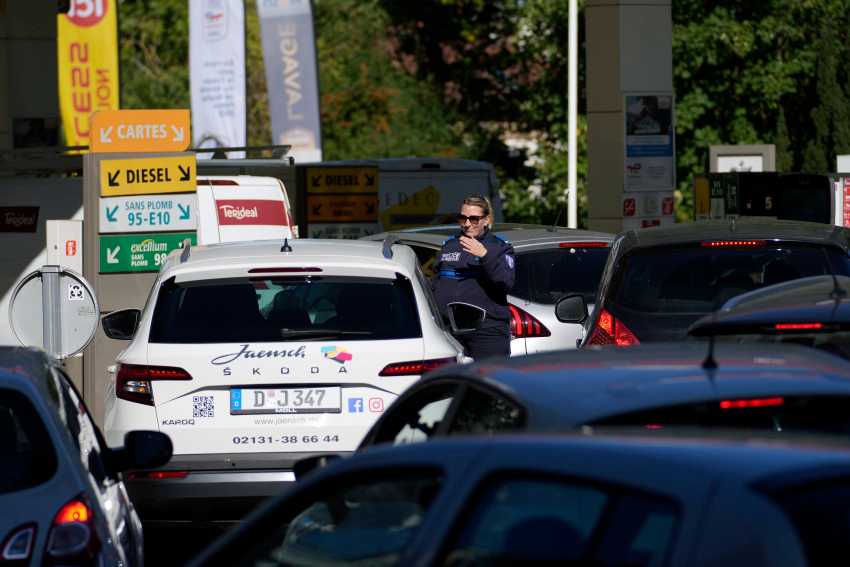French PM to requisition workers amid refineries strike

French Prime Minister Elisabeth Borne announced a decision to requisition workers operating petrol depots of ExxonMobil’s French branch Esso and threatened to do the same for those of Total group, amid strikes that have led fuel pumps to run dry in the country.
The drastic measure came as drivers waiting in long lines to fill up their cars and gas stations closed while awaiting deliveries have become an increasingly familiar sight in France in recent days.
At a gas station in Vincennes, in the eastern suburbs of Paris, Alexandre Leonardi, 31, was not surprised to see the long lines of cars.
“I’ve been here for about an hour ... I expected it to be like this. Most of the gas stations I went past were closed,” he told The Associated Press.
Requisitions allow authorities to order some of the workers of the petrol depots hit by strikes to return to work. It was not immediately clear how the order would be applied. A similar measure was imposed in 2010 during strikes in French refineries.
Speaking Tuesday at the National Assembly, Borne said about 30% of France’s petrol stations are experiencing temporary shortages with at least one or more type of fuel. She noted that strong differences between regions, Paris area and northern France being the most affected places — making life difficult for drivers.
She called for urgent dialogue between unions and management as strikers seek pay rises amid soaring inflation in the country.
“A salary disagreement do not justify blocking the country,” she said.
Borne's announcement comes one day after a deal was reached between two unions and Esso's leadership over a pay rise. Yet some other hard-left unions have rejected it and decided to continue the strike. “I asked prefects to launch the procedure to requisition workers who are indispensable to the functioning” of the Esso petrol depots, Borne said.
She added that she is ready to make a similar decision regarding Total facilities if salary negotiations do not start quickly.
Panic buying by some people worried that stations might run out of fuel altogether is exacerbating problems facing motorists, though authorities are urging consumers not to worry. Government officials said they increased petrol imports and released some of the state's strategic stocks to help ease the shortages — amid concern that they could prompt protests across the country.
“There is only one solution: to unlock (the situation) without delay through negotiation,” Finance Minister Bruno Le Maire said Tuesday on French news broadcaster Franceinfo.
At gas stations that remained open, people were getting increasingly nervous. Some were jumping the queue while others were trying to fill fuel containers, despite several cities across France prohibiting it. “This is not acceptable in France, just because a few people (strikers) want to annoy the world. It’s their problem, not the problem of all French people,” said 81-year-old Odette Libert while queuing at the Vincennes gas station.
The drastic measure came as drivers waiting in long lines to fill up their cars and gas stations closed while awaiting deliveries have become an increasingly familiar sight in France in recent days.
At a gas station in Vincennes, in the eastern suburbs of Paris, Alexandre Leonardi, 31, was not surprised to see the long lines of cars.
“I’ve been here for about an hour ... I expected it to be like this. Most of the gas stations I went past were closed,” he told The Associated Press.
Requisitions allow authorities to order some of the workers of the petrol depots hit by strikes to return to work. It was not immediately clear how the order would be applied. A similar measure was imposed in 2010 during strikes in French refineries.
Speaking Tuesday at the National Assembly, Borne said about 30% of France’s petrol stations are experiencing temporary shortages with at least one or more type of fuel. She noted that strong differences between regions, Paris area and northern France being the most affected places — making life difficult for drivers.
She called for urgent dialogue between unions and management as strikers seek pay rises amid soaring inflation in the country.
“A salary disagreement do not justify blocking the country,” she said.
Borne's announcement comes one day after a deal was reached between two unions and Esso's leadership over a pay rise. Yet some other hard-left unions have rejected it and decided to continue the strike. “I asked prefects to launch the procedure to requisition workers who are indispensable to the functioning” of the Esso petrol depots, Borne said.
She added that she is ready to make a similar decision regarding Total facilities if salary negotiations do not start quickly.
Panic buying by some people worried that stations might run out of fuel altogether is exacerbating problems facing motorists, though authorities are urging consumers not to worry. Government officials said they increased petrol imports and released some of the state's strategic stocks to help ease the shortages — amid concern that they could prompt protests across the country.
“There is only one solution: to unlock (the situation) without delay through negotiation,” Finance Minister Bruno Le Maire said Tuesday on French news broadcaster Franceinfo.
At gas stations that remained open, people were getting increasingly nervous. Some were jumping the queue while others were trying to fill fuel containers, despite several cities across France prohibiting it. “This is not acceptable in France, just because a few people (strikers) want to annoy the world. It’s their problem, not the problem of all French people,” said 81-year-old Odette Libert while queuing at the Vincennes gas station.
Source: japantoday.com
